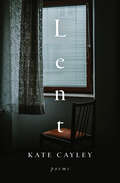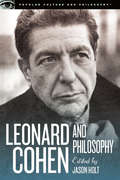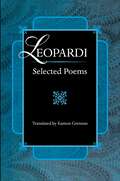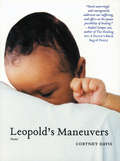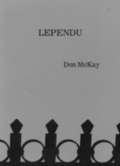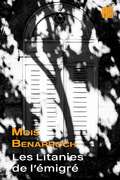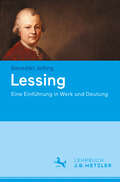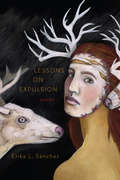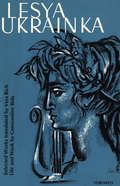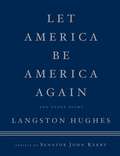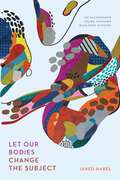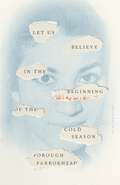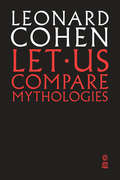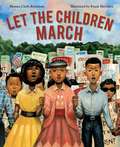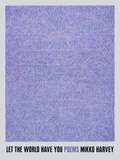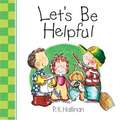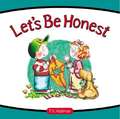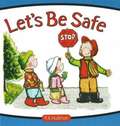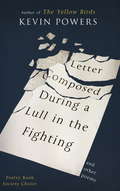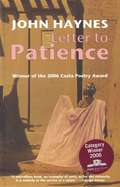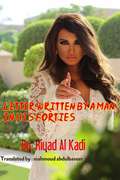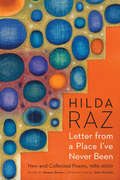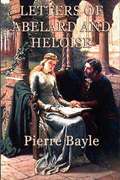- Table View
- List View
Lent: Poems
by Kate CayleyIn these peculiar times, we are thrust back into ourselves in a kind of suspension: one in which only private life exists yet threatens to become trivial through a sense of mutual, overarching dread.Lent from award-winning writer Kate Cayley is built from this tension, exploring domestic and artistic life amidst the environmental crisis, and the surprising ways that every philosophical quandary—large and small—converges in the home, in small objects, conversations, moments.Grotesque and tedious, baroque and banal intertwine in the first three sections. Meticulous depictions of spectacle run into the repetition of daily domestic life: trying to explain time to children, day trips to the planetarium and strangers' warnings, intersperse depictions of Mary Shelley recalling the monster, the inner life of a Seventeenth Century portrait sitter, Ted Hughes' second wife telling her story to the dead Sylvia Plath, Rusalski—souls of drowned innocents in the lake.The final, title section, explores religious faith; how belief is itself a repetition, a slow accumulation over time, just like love or forgiveness.Lent is an exquisite work of our era, asking us to contemplate what it means to live in a broken world—and why we still find it beautiful.
Leonard Cohen and Philosophy: Various Positions
by Jason HoltFrom the early years, when he morphed from celebrated poet to provocative singer-songwriter, to his induction into the Rock and Roll Hall of Fame, Leonard Cohen has endured as one of the most enigmatic and profound figures-with a uniquely compelling voice and unparalleled depth of artistic vision-in all of popular music.<P><P> The aesthetic quality and intellectual merit of Cohen's work are above dispute; here, for the first time, a team of philosophers takes an in-depth look at its real significance.Want to know what Cohen and Kierkegaard have in common? Or whether Cohen rivals the great philosophical pessimist Schopenhauer? Then this book is for you. It provides the first thorough analysis of Cohen from various (philosophical) positions. It is intended not only for Cohen fans but also undergraduates in philosophy and other areas. It explores important neglected aspects of Cohen's work without attempting to reduce them to academic tropes, yet nonetheless will also be useful to academics-or anyone-beguiled by the enigma that is Leonard Cohen.
Leopardi: Selected Poems (The Lockert Library of Poetry in Translation #125)
by Giacomo LeopardiThese translations of the major poems of Giacomo Leopardi (1798--1837) render into modern English verse the work of a writer who is widely regarded as the greatest lyric poet in the Italian literary tradition. In spite of this reputation, and in spite of a number of nineteenth-and twentieth-century translations, Leopardi's poems have never "come over" into English in such a way as to guarantee their author a recognition comparable to that of other great European Romantic poets. By catching something of Leopardi's cadences and tonality in a version that still reads as idiomatic modern English (with an occasional Irish or American accent), Leopardi: Selected Poems should win for the Italian poet the wider appreciative audience he deserves. His themes are mutability, landscape, love; his attitude, one of unflinching realism in the face of unavoidable human loss. But the manners of the poems are a unique amalgam of philosophical toughness and the lyrically bittersweet. In a way more pure and distilled than most others in the Western tradition, these poems are truly what Matthew Arnold asked all poetry to be, a "criticism of life." The translator's aim is to convey something of the profundity and something of the sheer poetic achievement of Leopardi's inestimable Canti.
Leopold's Maneuvers (Prairie Schooner Book Prize in Poetry)
by Cortney DavisIn the venerable tradition of caregivers writing about the healing arts—a tradition peopled by the likes of Anton Chekhov, Walt Whitman, William Carlos Williams, Walker Percy, and Denise Levertov—Cortney Davis brings to poetry the experience, insight, and compassion of a nurse practitioner who daily confronts the unexpected frailties, passions, and power of the flesh. Taking the body as her text, Davis crafts her poetry from the pains of labor and the joys of birth, the depredations of disease and the sustaining hope of recovery. She trains her clear, unflinching gaze on the unfolding scene—a woman shipwrecked with a stranger; an adult reinventing childhood; an ill woman rediscovering pleasure in her body; a nurse realizing, in one harrowing instant, that she is as vulnerable as her patients—unerringly finding the particular image, the human detail, that connects reader, writer, and subject with the world. Primal, compelling, intelligent, these poems show us how to see as clearly as the poet does, with empathy and grace.
Lependu
by Don McKayA prose/poetry sequence concerning the hanged man of London, Ontario, by the award-winning author of Birding, or Desire; Sanding Down This Rocking Chair on a Windy Night; Night Field; Apparatus and Another Gravity.
Leprechaun Luck: A Wee Book of Irish Wisdom
by Erin GobraghA collection of Irish blessings, sayings, and verses about such things as friendship, home, and happiness.
Les Litanies de l'émigré
by Mois Benarroch Helene CoursaultLe poete et romancier Benarroch a été traduit dans des dizaines de langues, dont l'urdu et le chinois. Julia Uceda considère que la poésie de Benarroch renferme la mémoire du monde alors que Jose Luis Garcia Martin pense qu'il s'agit de plus que de poèmes, il s'agit d'une référence. Témoin de son temps, Benarroch a commencé à écrire des poèmes en anglais à l'âge de 15 ans et a toujours écrit dans sa langue maternelle, l'espagnol. Il s'agit d'une nouvelle édition de « Les Litanies de l'émigré », elle inclut le poème le plus célèbre de Benarroch, qui donne son nom à cette collection. Dans ce livre, Mois Benarroch (né en 1959 au Maroc) évoque son émigration et l'art de vivre entre deux mondes, sans jamais s'intégrer.
Lessing: Eine Einführung in Werk und Deutung
by Benedikt JeßingGotthold Ephraim Lessing ist neben Schiller und Goethe der meistgelesene und -unterrichtete deutsche Dichter des 18. Jahrhunderts. Sein Werk, das v.a. mit dem Begriff des bürgerlichen Trauerspiels und dem Nathan verbunden ist, umfasst daneben Lustspiele, Fabeln und Lyrik und gilt als Höhepunkt der literarischen Aufklärung. Mindestens ebenso wichtig zum Verständnis seiner Schriften ist die Tradition der Empfindsamkeit, die er in seinen theoretischen Arbeiten und literarischen Werken fortführt. Der Band erschließt auf Basis einer knappen Erörterung der theoretischen Positionen die wichtigsten Werke Lessings in textnahen Lektüren.
Lessons on Expulsion: Poems
by Erika L. SánchezAn award-winning and hard-hitting new voice in contemporary American poetryThe first time I ever came the light was weak and carnivorous.I covered my eyes and the night cleared its dumb throat.I heard my mother wringing her hands the next morning.Of course I put my underwear on backwards, of course the elastic didn't work.What I wanted most at that moment was a sandwich.But I just nursed on this leather whip.I just splattered my sheets with my sadness. —from “Poem of My Humiliations”“What is life but a cross / over rotten water?” Poet, novelist, and essayist Erika L. Sánchez’s powerful debut poetry collection explores what it means to live on both sides of the border—the border between countries, languages, despair and possibility, and the living and the dead. Sánchez tells her own story as the daughter of undocumented Mexican immigrants and as part of a family steeped in faith, work, grief, and expectations. The poems confront sex, shame, race, and an America roiling with xenophobia, violence, and laws of suspicion and suppression. With candor and urgency, and with the unblinking eyes of a journalist, Sánchez roves from the individual life into the lives of sex workers, narco-traffickers, factory laborers, artists, and lovers. What emerges is a powerful, multifaceted portrait of survival. Lessons on Expulsion is the first book by a vibrant, essential new writer now breaking into the national literary landscape.
Lesya Ukrainka
by Vera Rich Constantine BidaThe Ukrainian national poetess Lesya Ukrainka (1871-1913) has contributed greatly to the development of Ukrainian Modernism and its transition from Ukrainian ethnographic themes to subjects that were universal, historical and psychological. Breaking the thematic conventions of populist literature, she sought difficult and complex motifs and gave them original treatment: themes such as the revolutionary ideological conflicts of the seventeenth and eighteenth centuries, which appear in some of her later poetry, are strengthened, given greater impact by her method of applying the individual and the personal to the more general concepts.From the beginning of her career her poetry was characterized by the theme of the poet's vocation and by the motifs connected with it--loneliness and alienation from society. Associated motifs deal with her love of freedom (national freedom in particular) and her hatred of anything weak and undecided.This book, sponsored by the Women's Council of the Ukrainian Canadian Committee, is a discussion of her life and works and includes selected translations: Robert Bruce (1903), Cassandra (1907), The Orgy (1913), The Stone Host (1912), and "Contra spem spero." Readers interested in development of poetic style can study the gradual evolution from the lyrical to the precise and analytical manner of the prose-poems of Lesya Ukrainka, and discover the thematic wealth, depth of thought, and emotional power of her poetry.
Let America Be America Again and Other Poems
by Langston HughesThe poems collected here offer a hopeful, truly democratic vision for America. Incantatory and stirring, passionate and provocative, they are as resonant for our times as they were over half a century ago.
Let Our Bodies Change the Subject (The Raz/Shumaker Prairie Schooner Book Prize in Poetry)
by Jared HarélLet Our Bodies Change the Subject is a poetry collection that dives headlong into the terrifying, wondrous, sleep-deprived existence of being a parent in twenty-first-century America. In clear, dynamic verses that disarm then strike, Jared Harél investigates our days through the keyhole of domesticity, through personal lyrics and cultural reckonings. Whether taking a family trip to Coney Island or simply showing his son snowflakes on Inauguration morning, Harél guides us toward moments of intimacy and understanding, humor and grief. &“I will try,&” he admits, &“to be better than myself, which is all/I&’ve ever wanted and everything I need.&” Winner of the Raz/Shumaker Prairie Schooner Book Prize in Poetry, Let Our Bodies Change the Subject is a secular prayer. Hoping against hope, Harél works to reconcile feelings of luck and loss, of living for joy while fearing the worst.
Let Us Believe in the Beginning of the Cold Season: Selected Poems
by Forough FarrokhzadA ravishing new translation of Iran’s trailblazing, feminist poet in an indispensable collection In the years since her tragic death in a car accident at age thirty-two in 1967, Forough Farrokhzad has become a poet as iconic and influential as Lorca or Akhmatova, celebrated as a pioneer of modernist Iranian literature and as a leading figure of contemporary world literature. Farrokhzad, as Elizabeth Gray writes in the preface, “remains a beacon to artists, especially women and marginalized artists, who seek freedom in all its forms.” This thoughtfully curated, deftly translated selection of Farrokhzad’s poems includes work from her whole writing life, early to late. Readers will thoroughly treasure this expansive poet of the quotidian; of longing, loss, and desire; of classical reinvention; of lexical variation and sonic beauty; of terrifying wisdom, hope, and grief.
Let Us Compare Mythologies
by Leonard CohenPublished in 1956 to immediate acclaim, Leonard Cohen’s first published book contains poems written between the ages of fifteen and twenty. Now new generations of readers will rediscover not only the early, though no less accomplished and passionate, work of one of our most beloved writers, but poetry that resonates loudly with relevance today.
Let the Children March
by Frank Morrison Monica Clark-RobinsonI couldn't play on the same playground as the white kids. I couldn't go to their schools. I couldn't drink from their water fountains. There were so many things I couldn't do.In 1963 Birmingham, Alabama, thousands of African American children volunteered to march for their civil rights after hearing Dr. Martin Luther King Jr. speak. They protested the laws that kept black people separate from white people. Facing fear, hate, and danger, these children used their voices to change the world. Frank Morrison's emotive oil-on-canvas paintings bring this historical event to life, while Monica Clark-Robinson's moving and poetic words document this remarkable time.
Let the World Have You
by Mikko HarveyThe new collection from RBC/PEN Canada New Voices Award winner Mikko Harvey. Mikko Harvey’s new collection invites readers into a world that is and is not the world we know. In poems at once surreal, satiric, and tender, we encounter a cast of surprising non-human characters — the bear who sells herbal remedies, the politically influential lizard, the mean butterfly — yet at the core of this book is Harvey’s impulse to confront the challenges of human intimacy. Let the World Have You is a vibrant report on the ways in which we are delightfully, awkwardly, heartbreakingly entangled: with each other, with the environment we inhabit, and with the psychological environments that inhabit us.
Let's Be Helpful
by P. K. HallinanFor ages 4+. Toddlers can follow young PK as he learns to be helpful around the house as he takes out the dog, empties the garbage and clears up his room. Toddlers too can follow PK's example and learn how to be helpful.
Let's Be Honest
by P. K. HallinanLittle P.K. knows how important it is to be honest! When he tells a tall tale or hides something he breaks, he admits his mistakes. By following P.K.'s example in this colorful, rhyming book, young readers will learn to be honest too.
Let's Be Safe
by P. K. HallinanLittle P.K. knows how important it is to be safe! He waits patiently at crosswalks, wears his bicycle helmet, and avoids talking to strangers. By following little P.K.'s example in this colorful, rhyming book, young readers will learn how to be safe each day too.
Letter Composed During a Lull in the Fighting
by Kevin PowersShortlisted for the 2014 TS Eliot PrizeShortlisted for the 2014 Forward Prize for Best First CollectionPoetry Book Society ChoiceIn this remarkable debut poetry collection, National Book Award finalist and Iraq war veteran Kevin Powers creates a startling, affecting portrait of a life shaped by war. LETTER COMPOSED DURING A LULL IN THE FIGHTING captures the many moments that comprise a soldier's life: driving down the Texas highway; waiting for the unknown in the dry Iraq heat; writing a love letter; listening to a mother recount her dreams. Written with honesty and insight, these poems strive to make sense of war and its echoes through human experience.Just as THE YELLOW BIRDS was hailed as the 'first literary masterpiece produced by the Iraq war,' (Los Angeles Times) this collection will prove to be a powerful, enduring classic.
Letter To Patience
by John Haynes"Letter to Patience" is a book-length poem in iambic pentameter, set in 'Patience's Parlour' a small, mud-walled bar in northern Nigeria in 1993 - a time of political unrest. The writer of the letter has returned to Britain, with his Nigerian wife and children, to nurse his dying father. He writes to Patience, the bar's owner, a woman in her 30s who once lectured in politics at Ahmadu Bello University, across the main road from her bar. She gave up her job partly because of junta pressures on radical academics. The town is volatile - the bar was attacked by the so-called Ayatollahs and would have been burnt had it not adjoined the property of her Hausa landlord. There are also thoughtful and elegant digressions thrown up by the multiple narratives. The book is not just biography or an essay on colonialism and post-colonialism, it is an epic portrayal of a beautiful and troubled country and one man's search for meaning in difficult times. All this is conveyed through a superbly crafted and thrillingly written poem.-amazon.com
Letter Written by a Man in His Forties: Poems - Arabic -
by Riyad Al Kadi Mahmoud Abdulbaseer'Letter Written by a Man in His Forties' is the translated version of a set of Arabic poems written by Riyad Al Kadi, a novelist and a poet-writer.
Letter from a Place I've Never Been: New and Collected Poems, 1986-2020
by Hilda RazHilda Raz has an ability &“to tell something every day and make it tough,&” says John Kinsella in his introduction. Letter from a Place I&’ve Never Been shows readers the evolution of a powerful poet who is also one of the foremost literary editors in the country. Bringing together all seven of her poetry collections, a long out-of-print early chapbook, and her newest work, this collection delights readers with its empathetic and incisive look at the inner and outer lives we lead and the complexities that come with being human. Showcasing the work of a great American voice, Letter from a Place I&’ve Never Been at last allows us to see the full scope and range of Raz&’s work.
Letter of Abelard and Heloise
by Pierre BaylePeter Abélard was a medieval French scholastic philosopher, theologian, and preeminent logician. The story of his affair with and love for Heloise has become legendary. Héloïse d'Argenteuil was a French nun, writer, scholar, and abbess, best known for her love affair and correspondence with Peter Abélard.
